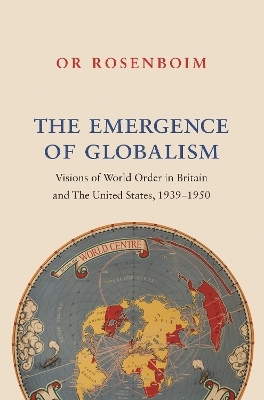
The Emergence of Globalism
Visions of World Order in Britain and the United States, 1939–1950
Seiten
2019
Princeton University Press (Verlag)
978-0-691-19150-8 (ISBN)
Princeton University Press (Verlag)
978-0-691-19150-8 (ISBN)
How competing visions of world order in the 1940s gave rise to the modern concept of globalismDuring and after the Second World War, public intellectuals in Britain and the United States grappled with concerns about the future of democracy, the prospects of liberty, and the decline of the imperial system. Without using the term "globalization,"
How competing visions of world order in the 1940s gave rise to the modern concept of globalism
During and after the Second World War, public intellectuals in Britain and the United States grappled with concerns about the future of democracy, the prospects of liberty, and the decline of the imperial system. Without using the term "globalization," they identified a shift toward technological, economic, cultural, and political interconnectedness and developed a "globalist" ideology to reflect this new postwar reality. The Emergence of Globalism examines the competing visions of world order that shaped these debates and led to the development of globalism as a modern political concept.
Shedding critical light on this neglected chapter in the history of political thought, Or Rosenboim describes how a transnational network of globalist thinkers emerged from the traumas of war and expatriation in the 1940s and how their ideas drew widely from political philosophy, geopolitics, economics, imperial thought, constitutional law, theology, and philosophy of science. She presents compelling portraits of Raymond Aron, Owen Lattimore, Lionel Robbins, Barbara Wootton, Friedrich Hayek, Lionel Curtis, Richard McKeon, Michael Polanyi, Lewis Mumford, Jacques Maritain, Reinhold Niebuhr, H. G. Wells, and others. Rosenboim shows how the globalist debate they embarked on sought to balance the tensions between a growing recognition of pluralism on the one hand and an appreciation of the unity of humankind on the other.
An engaging look at the ideas that have shaped today's world, The Emergence of Globalism is a major work of intellectual history that is certain to fundamentally transform our understanding of the globalist ideal and its origins.
How competing visions of world order in the 1940s gave rise to the modern concept of globalism
During and after the Second World War, public intellectuals in Britain and the United States grappled with concerns about the future of democracy, the prospects of liberty, and the decline of the imperial system. Without using the term "globalization," they identified a shift toward technological, economic, cultural, and political interconnectedness and developed a "globalist" ideology to reflect this new postwar reality. The Emergence of Globalism examines the competing visions of world order that shaped these debates and led to the development of globalism as a modern political concept.
Shedding critical light on this neglected chapter in the history of political thought, Or Rosenboim describes how a transnational network of globalist thinkers emerged from the traumas of war and expatriation in the 1940s and how their ideas drew widely from political philosophy, geopolitics, economics, imperial thought, constitutional law, theology, and philosophy of science. She presents compelling portraits of Raymond Aron, Owen Lattimore, Lionel Robbins, Barbara Wootton, Friedrich Hayek, Lionel Curtis, Richard McKeon, Michael Polanyi, Lewis Mumford, Jacques Maritain, Reinhold Niebuhr, H. G. Wells, and others. Rosenboim shows how the globalist debate they embarked on sought to balance the tensions between a growing recognition of pluralism on the one hand and an appreciation of the unity of humankind on the other.
An engaging look at the ideas that have shaped today's world, The Emergence of Globalism is a major work of intellectual history that is certain to fundamentally transform our understanding of the globalist ideal and its origins.
Or Rosenboim is a research fellow in politics at Queens’ College, University of Cambridge. She was co-awarded the prestigious Prix Raymond Aron in 2014.
| Erscheinungsdatum | 23.05.2019 |
|---|---|
| Zusatzinfo | 9 maps. |
| Verlagsort | New Jersey |
| Sprache | englisch |
| Maße | 156 x 235 mm |
| Themenwelt | Geschichte ► Allgemeine Geschichte ► 1918 bis 1945 |
| Geschichte ► Teilgebiete der Geschichte ► Militärgeschichte | |
| Sozialwissenschaften ► Politik / Verwaltung ► Europäische / Internationale Politik | |
| Sozialwissenschaften ► Politik / Verwaltung ► Politische Systeme | |
| Sozialwissenschaften ► Politik / Verwaltung ► Politische Theorie | |
| ISBN-10 | 0-691-19150-6 / 0691191506 |
| ISBN-13 | 978-0-691-19150-8 / 9780691191508 |
| Zustand | Neuware |
| Haben Sie eine Frage zum Produkt? |
Mehr entdecken
aus dem Bereich
aus dem Bereich
ein Psychologe erlebt das Konzentrationslager
Buch | Hardcover (2024)
Kösel (Verlag)
CHF 30,80
Mythos „Stauffenberg-Attentat“ – wie der 20. Juli 1944 verklärt und …
Buch | Hardcover (2024)
Goldmann (Verlag)
CHF 33,55


